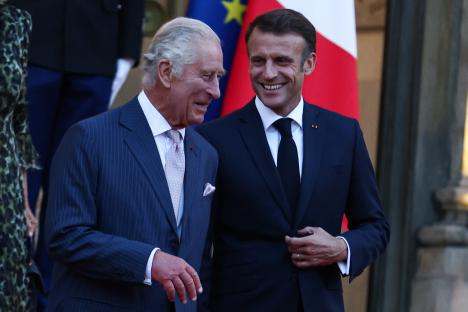What makes a good antagonist? Is it their backstory? Their sadness? The pain they carry because of the harm done to them? Does it matter? If they treat others as tools or a means to an end, should anyone care that they were once on the other side of someone else's cruelty? Take General Kirigan from the Netflix original series Shadow and Bone; he is a man the ages can't touch. Time stretches so far ahead of him that a century is almost a blink in existence to him.
Spoilers ahead for Shadow and Bone season 1.
Kirigan has been fighting far longer than any of the Grisha who surround him besides his mother Baghra, and it has made him singularly focused on one thing: the survival of the Grisha by any means necessary no matter who it corrupts, pains, or destroys.
Kirigan isn't bloodthirsty. He's not incapable of seeing the impact of his own actions. He's not merciless or unfeeling. Kirigan is simply self-centered to the point of ruin. It's a trait most likely born from being the only two of his kind.
As a powerful Shadow Summoner, he has outlived nearly everyone he cares for. And, if he didn't outlive them through the natural passing of time, he lost them to the prejudice and hatred that has seen Grisha murdered by Ravkans who fear their power and seek to snuff it out. Or the Fjerdans who consider Grisha to be witches and hunt them, dragging them back to their country to be tried and executed.
Kirigan lives long enough to see himself become the villain in Shadow and Bone
But, the facts of Kirigan's life, how he's suffered, doesn't negate his selfishness. Yes, he created the Shadow Fold in a fit of grief. He'd lost the woman he loved and watched her die in front of him as the Ravkan King's soldier stabbed her and left her to bleed out.
His people were being killed ruthlessly without pause, without hesitation, as if they weren't worth the air they breathed. As if their lives mattered so little that erasing them from existence was easy. As if ripping them from the fabric of history was like tearing a page out of a book. Leaving behind the evidence that something had been there, maybe even something vital, but it no longer existed.
How was the Fold made in Shadow and Bone?
It was genocide, so Kirigan tapped into abilities he barely understood, using ancient science he had no real concept of in practice, and he lost control. He split the country in two, dragging his enemies into the shadows of his creation and transforming them into beasts called Volcra. These are terrible creatures without a master trapped in the Fold, who have no sense other than attacking anything that moves especially if it's lit up the dark.
It's unclear in the first season of Shadow and Bone whether or not the text Kirigan read corrupted his spirit. We don't know if it created a greed in him, a lust for power and control centered on not losing the Grisha the way he'd nearly lost them before reading it. What is clear, however, is that his treatment of Alina Starkov, the Sun Summoner, is inexcusable.
There's a tendency with antagonists with sad backstories to use their past as a way of informing their present to excuse their behavior. With Kirigan, it's so easy to do that. He has essentially been alone for centuries. His relationship with Baghra is frayed and jagged, the two of them tied together by the seeming endlessness of their age, not a loving bond.
He has always had to accept that every relationship he has outside of his mother will be fleeting in comparison to his own life. The people he cared for would grow old. He would, too, just so slowly that it wouldn't matter. It's the price of having as much power as he does. A blessing but also a curse.
His one match, his equal, the Sun Summoner, was considered to be a legend. A story to be told around campfires or scoffed at as myth. Still, he waited. Until one day Alina blasted through the dark of the Shadow Fold and shined as bright as a star. Blinding in her power, she illuminated the area around her, destroying Volcra in the wake of her light and announcing her presence to the world.
Finally, Kirigan wasn't alone. He had Alina. He put down the role of the Darkling, of the general, and allowed himself to be Aleksander around her. It's a testament to Ben Barnes‘ acting that there is a fragility to Kirigan in his interactions with Alina. It's an almost shyness, an awe that very much feels like a man shaking himself of the cold he'd allowed to freeze his heart.
There is, however, also a possessiveness. A clearly intoxicating attraction that pushes past sweetness into obsession. Or at least a need that corrodes into isolating Alina from Mal, her best friend who she loves and is obviously in love with.
Kirigan is so convinced that he and Alina are meant for each other that he is not above manipulating her feelings. He's not above manipulating Mal or harming him or harming her. He is so determined to tie Alina to him that he forces her to stay by his side. He steals from her and controls her.
His excuse is that their power, as big as it is, will see them outlive everyone. So, in time, she'll forgive or at least move past what he did. It's the logic of the immortal. It's not that time will erase the wounds, but that they'll dull them. And Alina's agelessness will push her toward the one person who truly understands what it is to be like her.
Kirigan's reasoning is twisted. Alina says as much. Out of everyone, even Baghra, she is the one who seems to see Kirigan the clearest. Perhaps it's his vulnerability around her. His heart showing on his sleeve and in his eyes. In any case, when her infatuation gives way to horror, Alina holds Kirigan accountable for his actions.
Understanding why someone did what they did isn't the same as forgiveness or acceptance. Refusing to be his pawn or his puppet, Alina reminds Kirigan that they were supposed to save the Grisha together. That is an action, a drive, that involves agency and autonomy, not her forced to bend to his will.
What's next for Kirigan in Shadow and Bone season 2?
By the end of Shadow and Bone‘s first season, the question stops being whether General Kirigan is good or bad. Rather, it becomes whether or not he can be stopped. He tells Alina that she has cast him as the villain in her story, but it's not as simple as that. Kirigan has cast himself as the villain.
He is the one who has gone too far. It's his behavior and his inability to see past himself that has cost him a hold on the person he thought he was. A protector, a leader of his people. Now, he's a scorned man whose vengeance has tainted the work he has spent centuries cultivating.
The lives of others, including the Grisha, mean little in his path toward dominance of the region. If it means wiping out a town, so be it. Kirigan has no interest in being a hero and if he can't be a savior then he'll be a wrathful force let loose upon his enemies.
With the Volcra now in his control, Kirigan will be more powerful in Shadow and Bone season 2. Those who oppose him, like Alina and Mal, are going to have their work cut out for them to bring him down.
Next: Shadow and Bone: Who is Alina Starkov?



